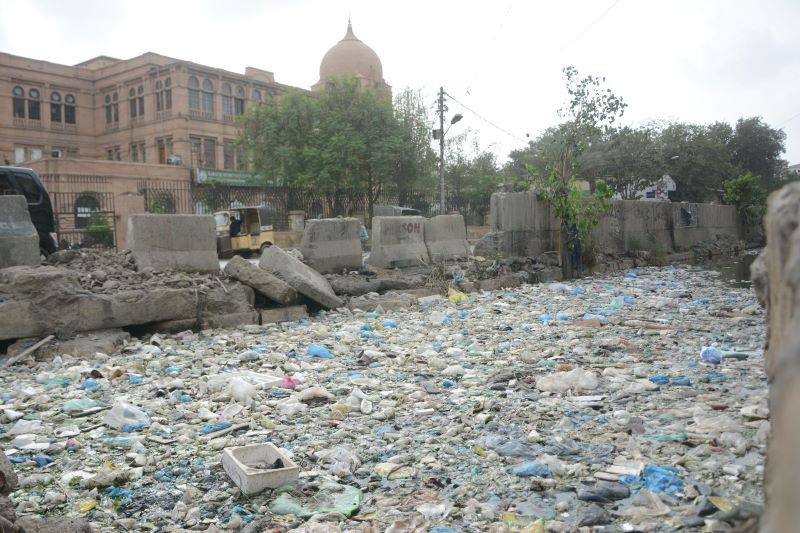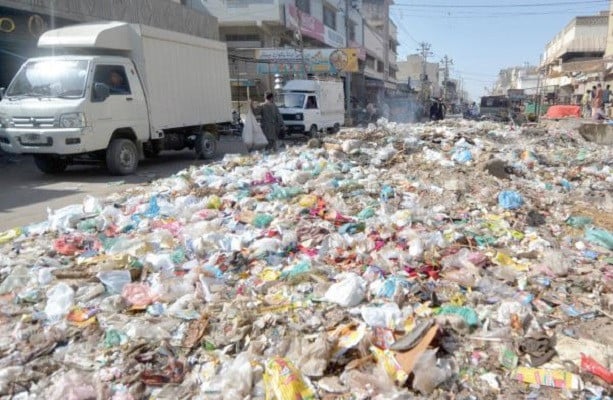
The images that flash before the eyes of any Karachiite is usually a pile of garbage, instead of a landscape with tall structures and clean roads. The metropolis which is the financial hub of the country has a mark, a mark that sets it apart from other metropolises of the world, immense amount of garbage.
The question arises as to the cause of such a massive amount of garbage disposed per day, why does it end up on the streets or worse, in the drainage system, and how to tackle this humongous task?
The answer is not as complicated as one would think, it is rather simple, one needs to control one’s urge to toss the garbage out the window of either one’s car or one’s flat. In a recent study a staggering figure of 16,500 metric ton of garbage per day was recorded by the government statistics posted on Pakistan Waste Management International Trade Administration’s website, if one were to multiply it by 30, the figure would amount to 495,000 ton of garbage per month, that is an alarming figure. According to Pakistan Bureau of Statistics, the current population of Karachi is 20,382,881 as per the census conducted in 2023, this makes it one of the most populous urban cities of the world. The estimated growth rate is 2.46 per cent which is a dangerously high figure. The city is overburdened. The institutions work to solve garbage problem on a yearly basis, but with such a massive growth and rur-urban migration, the correct figures are impossible to determine.

With such a high volume of people comes a high volume of waste, and what people fail to understand at times is that institutions have limited resources, it can only serve to collect garbage once or twice a day, a disproportionate number if looked against the waste thrown out which is every half an hour a day on an average. This problem is seen throughout the city, what one expects is little bit of civic sense in the more educated lot, however, it is seldom practiced as one witnesses plastic bags being thrown out of car windows, motorbikes or households themselves, the waste then gathers where the vector of the wind takes it.
It could be a high-income area like DHA, but one cannot stop the wind, and in the case of the said society, it has slum areas in the peripheries where waste is disposed off regularly by the residents dwelling in the said areas, the wind takes the waste to whatever direction it is flowing, hence the problem persists, and the waste ends up either clogging the drains, or it eventually ends up in the sea.
Only in one month the garbage collected from DHA along with CBC was 8000 metric tons of solid waste, which included building debris, which compounds the issue of waste management. One wonders if the trash collected from DHA is in such high figures, what would be the state of affairs in the rest of the metropolis. It is important to note that DHA has been conducting cleanliness campaigns throughout the year.
1613817194-4/Garbage-(5)1613817194-4.jpg)
If one were to compare another city to the megacity where such a high volume of people either reside or come to work, it is Bangkok, the financial hub of Thailand, boasting of thousands of tourists also visiting the scenic city. However, despite it being in the monsoon tropics, the garbage disposal is not a problem, as the local residents do not throw garbage away, neither are the tourists allowed to do so. Their civic sense is inculcated from a young age where children are encouraged to dispose of the garbage at designated areas. Hongkong and Tokyo are other such examples, Kuala Lumpur also a metropolis, does not have this issue. The important thing to note as a common denominator is a built-in civic sense and the threat of fines, which are imposed if an individual is found in violation.

While institutions are responsible for managing waste worldwide, it is important to realise one’s own responsibility, do not litter the city. Use allocated areas to dispose of the garbage, in order for the citizens to enjoy a breath of fresh air and clean streets, we need to also hold ourselves accountable, whether we are contributing to the solution, or are we part of the problem.




1730464033-0/BeFunky-collage-(12)1730464033-0-165x106.webp)
1732449527-0/Express-Tribune-(4)1732449527-0-270x192.webp)
1732441230-0/BeFunk_§_]__-(49)1732441230-0.jpg)


1732436825-0/BeFunk_§_]__-(47)1732436825-0.jpg)











COMMENTS
Comments are moderated and generally will be posted if they are on-topic and not abusive.
For more information, please see our Comments FAQ